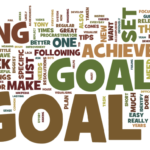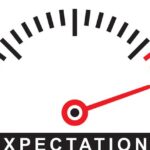Setting expectations for your young ski racer is an essential responsibility of parenting. Expectations tell your children what’s important to you and establish a standard toward which they can strive. But expectations can be double-edged swords. They can be a tremendous benefit to your children’s development as both ski racers and people or they can be crushing burdens that hamper their growth. It all depends on what types of expectations you set for them (or rather what expectations you help them set for themselves). Unfortunately, the culture of achievement that permeates ski racing (and most of children’s lives) – it’s all about results! – has convinced many parents to set the wrong kinds of expectations for their young ski racers.
Unhealthy Expectations of Success
There are two types of expectations that you shouldn’t set for your children: ability expectations and outcome expectations. Ability expectations are those in which children are expected to achieve a certain result because of their natural ability, “We expect you to win the race today because you’re the most talented skier on the hill” or “We expect you to make Topolino because you’re the best racer out there.” The problem with ability expectations is that children have no control over their ability. Children are born with a certain amount of ability (and what ability they get depends entirely on the genes their parents give them) and all they can do is maximize whatever ability they are given. The fact is that if your children aren’t meeting your ability expectations, you have no one to blame but yourself—you didn’t give them good enough genes! Another problem with ability expectations is that if children attribute their successes to their ability—“I won because I’m so talented”—they must attribute their failures to their lack of ability—“I’m failed because I’m just not good enough.” And, though racers can gain strength and skills, they can’t gain more ability.
Our culture of achievement also emphasizes results over all else. As a consequence, ski-racing parents often set outcome expectations in which their children are expected to produce a certain result—“We expect you to win this race” or “We know you to qualify for JOs.” The problem is that, once again, children are asked to meet an expectation over which they may not have control. They might ski as fast as they possibly can but still not meet your outcome expectations because other racers just happened to be faster that day. So they would have to consider themselves as having failed despite what may very well have been a great race on their part. Setting outcome expectations also communicates to your children that you value results over everything else, so they’ll come to judge themselves by the same standards. Contrary to what you may believe, ability and outcome expectations actually hinder your children’s ski-racing efforts.
Results Matter!
Now you might be thinking, “Wait a minute! I can’t push my kids to get good results in ski racing? No way I’m buying this one.” Before you jump all over me, give me some latitude to bring all these ideas back to the real world.
Here is a simple reality that we all recognize in our culture: results matter! No two ways about it, in most parts of our society, people are judged on the results they produce: grades, victories, earnings. Though it would be great if every young racer was rewarded for their good efforts, that is just not the way the world works. Unfortunately, this societal focus can cause you as parents to place your desire for your children to succeed—as defined by that culture of achievement—ahead of their long-term development and enjoyment of ski racing.
Outcome Expectations
I would recommend that you give up outcome expectations all together, but still give your children outcome “somethings.” Those somethings I refer to are outcome goals. Goals are very different from expectations. Outcome expectations are often set by parents and placed in front of their children without their consultation or “buy in,” and kids often feel dragged—sometimes kicking and screaming—toward those expectations. Children have no ownership of the expectation and little motivation, outside an implied threat from their parents, to fulfill the expectations. When I ask young racers about expectations, they usually grimace and say things like, “That’s when my parents get really serious and I know they’re gonna put pressure on me” or “They’re telling me what to do and I better do it or I’ll get into trouble.” Not exactly “feel-good” parenting! Outcome expectations are also black and white; your children either meet the expectation and succeed or they don’t and they fail. So there is very little opportunity for success and lots of room for failure.
Goals are very different. I believe that children are wired to respond to goals. One of the great joys in life is to set a goal, work toward a goal, and achieve a goal. Children want to set goals for themselves, with guidance from parents and coaches, and they want to pursue those goals. Importantly, goals aren’t black and white, but about degree of attainment. Not every goal is achieved, but there will almost always be improvement toward a goal and that progress defines success. When I ask kids about goals, they respond much differently. Their faces perk up and they say things like, “It means I decide to do something and I really work hard to do it” or “I feel like my parents are really behind me and I’m psyched to do it.”
For example, let’s say your young racer has been finishing in the top 20 in recent races and he sets an outcome expectation of finishing in the top 10 in the next race. But he finishes 12th. According to his outcome expectation, he would have failed because he didn’t meet that expectation. But if he had set an outcome goal of a top-10 finish, then his result would be a success because, though not fully achieving his goal, he showed significant improvement toward the goal.
Many parents believe that results at a young age are important, so they emphasize results and place outcome expectations on their children. Yet the early years of ski racing are about gaining experience, learning, and improving, and developing the attitudes and mental skills necessary for later success. Using goals rather than expectations is one of the best ways to foster this growth.
But even outcome goals aren’t ideal. Many parents think that focusing on the result will increase the chances that their young racer will achieve that result, but the opposite is actually true. Here’s why. When does the outcome of a ski race occur? At the finish line, of course. And if young racers are focusing on the finish line, what are they not focusing on? Well, the process, obviously. Here’s the irony. By focusing on the process rather than the result, young racers will more likely ski better and, if they ski better, they’re more likely to achieve the result you wanted in the first place. Also, why do children get nervous before a race? Because they’re afraid of the result, more specifically, they’re afraid of failure. So by getting young racers focused on the process, they’ll be less nervous and will focus on what they need to do to get down the hill as fast as possible. And, if all goes well (and you have to expect that all won’t always go well in ski racing), the result will be good.
So if you’re going to set outcome somethings, set outcome goals, but then immediately direct your children’s focus onto the process, that is, what they need to do to achieve the desired outcome.
Bode Miller is my poster child of the unimportance of results early in ski racers’ careers. Bode never raced at Topolino, never won a Junior Olympic gold medal, and never won a World Junior Championship medal. And he has never cared about result!. All Bode ever cared about was, as he put it in his autobiography, Bode: Go Fast, Be Good, Have Fun, to ski “as fast as the natural universe will allow.” And, thanks to that attitude, Bode is one of the greatest ski racers in history.
Effort Expectations
If you want your children to be successful, instead of setting ability and outcome expectations, you should establish effort expectations, that will actually encourage them to do what it takes to achieve the outcomes you want. Effort expectations are within your children’s control; they can choose to work hard or not. Think about what your children need to do to reach their ski racing goals: commitment, hard work, discipline, patience, focus, persistence, perseverance, positive attitude. Examples of effort expectations may include “Our family expects you to make your ski racing a priority” or “Our family expects you to give your best effort in training and races.” Regardless of the abilities your children inherited from you or with whom they might be compared, children have the capacity to use effort expectations and the tools associated with them to be the best they can be in their ski racing (or whatever area of life they choose to pursue).
Effort expectations should be established in collaboration with your children. This cooperative approach ensures that your children have ownership of the expectations rather than feeling that you have forced the expectations on them. You can talk to your children about the value of effort, how it will help them achieve their goals, and that they have complete control over their effort. You can share examples with your children of how notable people used the skills associated with effort to become successful (for example, Lindsay Vonn and Ted Ligety). Most important, you want to help them make the connection between their efforts and achieving their goals.
If your children meet the effort expectations they established, they will, in all likelihood, ski well, achieve some level of success (how successful they become will depend on what abilities they were born with), and gain satisfaction in their efforts. If your children don’t meet the effort expectations, they are not likely to achieve their goals and must face the consequences of their lack of sufficient effort, for example, disappointment. In either case, your young ski racers will learn essential life lessons that will not only serve them well throughout their ski-racing careers—whether it ends after high school or carries them onto the Olympic podium—and in all future goals they pursue throughout their lives.
Note: If you want to get a jump on achieving Prime Ski Racing, you can order my Prime Ski Racing book and Mental Edge CD here.






